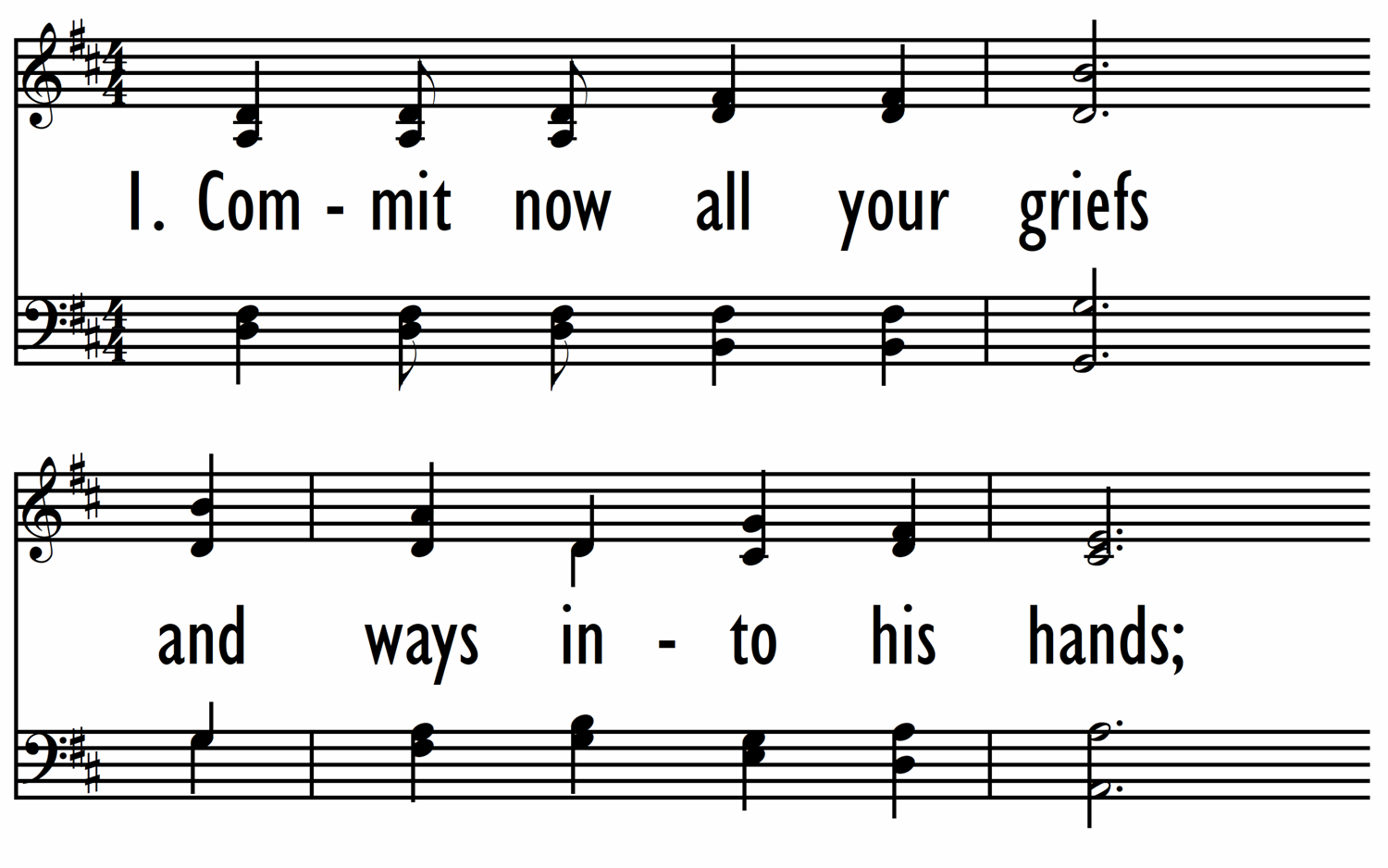- |
User Links
Commit Thou All Thy Griefs

Commit thou all thy griefs
Author: Paul Gerhardt (1653); Translator: John Wesley (1737)Published in 243 hymnals
Printable scores: PDF, MusicXMLAudio files: MIDI, Recording
Representative Text
1 Commit thou all thy griefs
And ways into His hands,
To His sure truth and tender care,
Who earth and heaven commands.
2 Who points the clouds their course,
Whom winds and seas obey,
He shall direct thy wandering feet,
He shall prepare thy way.
3 Thou on the Lord rely,
So safe, shalt thou go on;
Fix on His work thy steadfast eye,
So shall thy work be done.
4 No profit canst thou gain
By self-consuming care;
To Him commend thy cause, His ear
Attends the softest prayer.
5 Thy everlasting truth,
Father, Thy ceaseless love,
Sees all Thy children's wants, and knows
What best for each will prove.
6 Thou everywhere hast sway,
And all things serve Thy might,
Thy every act pure blessing is,
Thy path unsullied light.
AMEN.
Source: The A.M.E. Zion Hymnal: official hymnal of the African Methodist Episcopal Zion Church #79
Author: Paul Gerhardt
 Paul Gerhardt (b. Gräfenheinichen, Saxony, Germany, 1607; d. Lubben, Germany, 1676), famous author of Lutheran evangelical hymns, studied theology and hymnody at the University of Wittenberg and then was a tutor in Berlin, where he became friends with Johann Crüger. He served the Lutheran parish of Mittenwalde near Berlin (1651-1657) and the great St. Nicholas' Church in Berlin (1657-1666). Friederich William, the Calvinist elector, had issued an edict that forbade the various Protestant groups to fight each other. Although Gerhardt did not want strife between the churches, he refused to comply with the edict because he thought it opposed the Lutheran "Formula of Concord," which condemned some Calvinist doctrines. Consequently, he was r… Go to person page >
Paul Gerhardt (b. Gräfenheinichen, Saxony, Germany, 1607; d. Lubben, Germany, 1676), famous author of Lutheran evangelical hymns, studied theology and hymnody at the University of Wittenberg and then was a tutor in Berlin, where he became friends with Johann Crüger. He served the Lutheran parish of Mittenwalde near Berlin (1651-1657) and the great St. Nicholas' Church in Berlin (1657-1666). Friederich William, the Calvinist elector, had issued an edict that forbade the various Protestant groups to fight each other. Although Gerhardt did not want strife between the churches, he refused to comply with the edict because he thought it opposed the Lutheran "Formula of Concord," which condemned some Calvinist doctrines. Consequently, he was r… Go to person page >Translator: John Wesley
 John Wesley, the son of Samuel, and brother of Charles Wesley, was born at Epworth, June 17, 1703. He was educated at the Charterhouse, London, and at Christ Church, Oxford. He became a Fellow of Lincoln College, Oxford, and graduated M.A. in 1726. At Oxford, he was one of the small band consisting of George Whitefield, Hames Hervey, Charles Wesley, and a few others, who were even then known for their piety; they were deridingly called "Methodists." After his ordination he went, in 1735, on a mission to Georgia. The mission was not successful, and he returned to England in 1738. From that time, his life was one of great labour, preaching the Gospel, and publishing his commentaries and other theological works. He died in London, in 17… Go to person page >
John Wesley, the son of Samuel, and brother of Charles Wesley, was born at Epworth, June 17, 1703. He was educated at the Charterhouse, London, and at Christ Church, Oxford. He became a Fellow of Lincoln College, Oxford, and graduated M.A. in 1726. At Oxford, he was one of the small band consisting of George Whitefield, Hames Hervey, Charles Wesley, and a few others, who were even then known for their piety; they were deridingly called "Methodists." After his ordination he went, in 1735, on a mission to Georgia. The mission was not successful, and he returned to England in 1738. From that time, his life was one of great labour, preaching the Gospel, and publishing his commentaries and other theological works. He died in London, in 17… Go to person page >Text Information
| First Line: | Commit thou all thy griefs |
| Title: | Commit Thou All Thy Griefs |
| German Title: | Befiehl du deine Wege |
| Author: | Paul Gerhardt (1653) |
| Translator: | John Wesley (1737) |
| Meter: | 6.6.8.6 D |
| Language: | English |
| Copyright: | Public Domain |
Commit thou all thy griefs. A noble but free translation, omitting stanzas v., ix.-xi., by J. Wesley in Hymns & Sacred Poems, 1739 (Poetical Works, 1868-72, vol. i. p. 125), in 8 stanzas of 8 lines Though free, it has in far greater measure than any other caught the ring and spirit of Gerhardt. Included as No. 37 in the Hymns and Spiritual Songs, 1753, and as Nos. 103-104 in the Pocket Hymn Book, 1785, but not included in the Wesleyan Hymn Book, till as Nos. 673, 674 in the Supplement of 1830 (stanza iii., lines 4-8, being omitted), and thence as No. 831 in the edition of 1875. This translations has come into very extended use, but generally abridged; Mercer, in the 1857 edition of his Church Psalm and Hymn Book, giving it in full, but abridging it to 8 stanzas in his Oxford edition, 1864. Among recent collections it is found under its original first line in the Baptist Psalms and Hymns, 1858, Sarum Hymnal, 1868, Irish Church Hymnal, 1873, Scottish Presbyterian Hymnal, 1876, Horder's Congregational Hymns, 1884, and others; and in America in the Plymouth Collection, 1855, Sabbath Hymn Book, 1858, Hymns and Songs of Praise, N. Y., 1874, Evangelical Hymnal, N. Y., 1880, and many others. In the United Presbyterian Hymn Book, 1852, it began, "To God commit thy griefs." It is also found as follows:—
1. "Thou on the Lord rely" (Wesley's iii.), in Knight's Collection, Dundee, 1871-74.
2. "Thy everlasting truth" (Wesley's v.), in Adams's Church Pastorals, Boston, U.S., 1864.
3. "Give to the winds thy fears" (Wesley's ix.), in Kennedy, 1863, and many English and American Collections.
4. "0 cast away thy fears " (Wesley's ix. altered), in United Presbyterian Hymn Book, 1852.
5. “Through waves and clouds and storms " (Wesley's x.), in Davies and Baxter's Collection, 1835.
6. "Leave to His sovereign sway" (Wesley's xiii.), in Adams's Church Pastorals, Boston, U.S., 1864.
7. "Thou seest our weakness, Lord " (Wesley's xv.), in American Methodist Episcopal Hymns, 1849.
8. "Put thou thy trust in God," a greatly altered cento of which stanza i. is based on iii., lines 1-4; ii. on i., lines 1-4; iii. on iii., lines 1-4; and iv. on v., lines 5-8; appeared as No. 77 in the Mitre Hymn Book, 1836, and since in various hymnals, e.g. S.P.C.K. Psalms and Hymns, 1853, Kennedy, 1863.
-- Excerpts from John Julian, Dictionary of Hymnology (1907)
Notes
Commit thou all thy griefs. A noble but free translation, omitting stanzas v., ix.-xi., by J. Wesley in Hymns & Sacred Poems, 1739 (Poetical Works, 1868-72, vol. i. p. 125), in 8 stanzas of 8 lines Though free, it has in far greater measure than any other caught the ring and spirit of Gerhardt. Included as No. 37 in the Hymns and Spiritual Songs, 1753, and as Nos. 103-104 in the Pocket Hymn Book, 1785, but not included in the Wesleyan Hymn Book, till as Nos. 673, 674 in the Supplement of 1830 (stanza iii., lines 4-8, being omitted), and thence as No. 831 in the edition of 1875. This translations has come into very extended use, but generally abridged; Mercer, in the 1857 edition of his Church Psalm and Hymn Book, giving it in full, but abridging it to 8 stanzas in his Oxford edition, 1864. Among recent collections it is found under its original first line in the Baptist Psalms and Hymns, 1858, Sarum Hymnal, 1868, Irish Church Hymnal, 1873, Scottish Presbyterian Hymnal, 1876, Horder's Congregational Hymns, 1884, and others; and in America in the Plymouth Collection, 1855, Sabbath Hymn Book, 1858, Hymns and Songs of Praise, N. Y., 1874, Evangelical Hymnal, N. Y., 1880, and many others. In the United Presbyterian Hymn Book, 1852, it began, "To God commit thy griefs." It is also found as follows:—
1. "Thou on the Lord rely" (Wesley's iii.), in Knight's Collection, Dundee, 1871-74.
2. "Thy everlasting truth" (Wesley's v.), in Adams's Church Pastorals, Boston, U.S., 1864.
3. "Give to the winds thy fears" (Wesley's ix.), in Kennedy, 1863, and many English and American Collections.
4. "0 cast away thy fears " (Wesley's ix. altered), in United Presbyterian Hymn Book, 1852.
5. “Through waves and clouds and storms " (Wesley's x.), in Davies and Baxter's Collection, 1835.
6. "Leave to His sovereign sway" (Wesley's xiii.), in Adams's Church Pastorals, Boston, U.S., 1864.
7. "Thou seest our weakness, Lord " (Wesley's xv.), in American Methodist Episcopal Hymns, 1849.
8. "Put thou thy trust in God," a greatly altered cento of which stanza i. is based on iii., lines 1-4; ii. on i., lines 1-4; iii. on iii., lines 1-4; and iv. on v., lines 5-8; appeared as No. 77 in the Mitre Hymn Book, 1836, and since in various hymnals, e.g. S.P.C.K. Psalms and Hymns, 1853, Kennedy, 1863.
-- Excerpts from John Julian, Dictionary of Hymnology (1907)


 My Starred Hymns
My Starred Hymns






